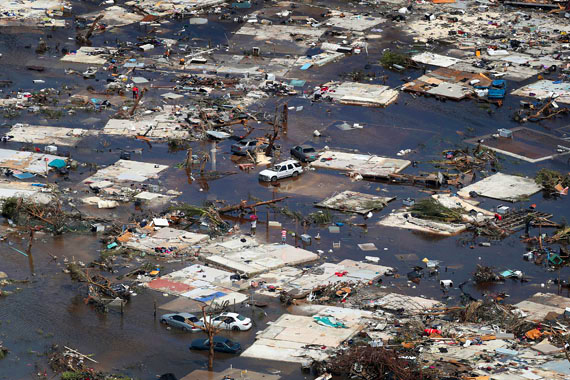| I’m here with the team, here’s what we know ▸ |

I’m here with our emergency response team in the Bahamas, and want to share with you what we’re seeing as we stage our response to Hurricane Dorian. When natural disasters strike, it always takes time to mount a full-scale emergency response. Urgent search and rescue takes priority, and humanitarian responders determine the highest needs, move into position and secure resources. Hours can feel like days in this part, but it’s necessary as we wait for more access to affected areas on the islands. Hurricane Dorian was one of the strongest Atlantic hurricanes on record. It pummeled the northwest Bahamas for nearly two full days before Mercy Corps responders could even get to Nassau, the capital. These have been challenging days for the people in dire need, for our team desperately trying to get there and help, and likely for you too as you wait to hear more about our response. 
Reports are now coming back from the most severely affected islands, Abaco and Grand Bahama, and it’s very clear that helping Bahamians recover from this catastrophic disaster will take time — time and commitment from the people showing up and from the global community powering this work. As a Mercy Corps supporter, you are part of that community. That’s why I want you to meet a few of the Mercy Corps emergency response team members here with me. I know how helpful it is for you to see the names and faces of the people coordinating our initial on-site response. They are supported by other team members at our headquarters, and through Mercy Corps’ network of humanitarians around the world, including you.
I’m so grateful to be here with these exceptional colleagues, and I’m confident that as we secure access to the most severely affected islands we will be able to move efficiently to help families and people in need. I’m here working to report on our response and raise awareness of the situation on the ground in the Bahamas. I will be meeting with survivors, listening to their stories and documenting their needs. As we wait with other humanitarian response teams, some of the conversation has turned to the historic severity of this storm and the effects a changing climate may be having on how hurricanes form and move through the oceans. I think of a comment I read from CNN meteorologist Brandon Miller earlier this week,
Looking at the images starting to come out of Abaco and Grand Bahama, it’s clear those kinds of changes have a profound effect on the lives and livelihoods of so many people, here and around the world. As humanitarians, we all have a role to play in helping families caught up in the effects of climate change — not just saving lives after disasters, but helping people to create lasting change and build resilient communities where their families can thrive. From these devastating hurricanes in Puerto Rico or the Bahamas to weather-related disasters — drought or flooding for example — in places like Ethiopia, Niger or Kenya, Mercy Corps’ teams are there in more than 40 countries around the world. They are providing communities at greatest risk with lifesaving assistance and the resources they need to re-establish healthy bodies and build prosperous livelihoods. Right now, this team is focused on the urgent crisis here in the Bahamas and is ready to move into action. If you want to learn more about our response here, you can visit our Quick Facts page on Hurricane Dorian, where we’ll be updating with more on our response as it continues to develop. Thank you for your support of the work we do. Christy Delafield Mercy Corps Director of Communications P.S. In every emergency, here and around the world, the best and fastest way to help people in the crisis is by donating. If you want to help, you can contribute to our Humanitarian Response Fund. |
|||||||||
| STAY CONNECTED |
|---|
|
||||||